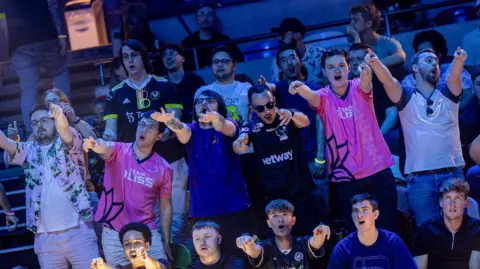In the realm of competitive gaming, or esports, the concept of home advantage has emerged as a topic of substantial interest. The question is whether players experience an enhancement in performance when competing before a local audience, akin to traditional sports. This matter was explored during the Rocket League Championship Series (RLCS) held in Birmingham, where four notable competitors were queried about the impact of home crowds on their game.
Esports generally allows fans and competitors to connect in ways that transcend physical boundaries, yet the visceral experience of being amidst the excitement of a live audience is often cited as an unparalleled aspect of these events. Many people have witnessed how home crowds can galvanize athletes; the Olympics serve as an example of this phenomenon, particularly illustrated by Great Britain’s impressive medal haul during the London 2012 Olympics and England’s national women’s football team triumphing at Wembley in 2022.
The RLCS event gathers 16 of the premier Rocket League teams globally, competing for staggering prizes exceeding £270,000 ($350,000). This particular championship gives competitors the chance to experience firsthand the warmth and energy of a supportive crowd, prompting inquiries about its effects on their performance.
Among the competitors, Finlay “rise.” Ferguson from Team Twisted Minds expressed that there’s a unique vibrancy to UK events. He passionately described the crowds in his home country as superior due to their creativity in cheering and distinct noise levels in comparison to American audiences. He believes this quality may stem from the UK’s long-lasting love affair with football, a sport deeply embedded in the fabric of British culture. Ferguson noted, “I think as an English player, the crowd will always get behind their own,” showcasing a perspective held by many that local support contributes significantly to performance.
Contrarily, Joe “Joyo” Young from Team Geekay remarked that while he recognizes the exhilarating atmosphere created by the crowd, it doesn’t drastically alter his game. As a competitor accustomed to the chaotic energy of his environment, he often tunes out the audience’s cheers to concentrate on his performance. His practice of wearing over-ear headphones during matches separates the game noise from the crowd’s sounds, allowing him to immerse himself in his gameplay.
In a similar vein, Jack “ApparentlyJack” Benton from Team Dignitas highlighted that competing in closer geographical proximity notably boosts his energy levels. He asserted that traveling long distances can lead to fatigue due to jet lag, which is especially detrimental in esports where rapid reflexes and acute focus are paramount. Benton mentioned, “The smallest reaction time differences can make a big difference to winning or losing,” underscoring how essential it is for players to be at their best during competitions.
Archie “Archie” Pickthall, also associated with Team Geekay, acknowledged yet another layer to local tournaments: familial support. His excitement for having family members cheering him on was palpable; given that his relatives can’t often travel for distant competitions. He believes the increase of global tournaments in the UK has expanded opportunities for families to experience the thrill of live esports events together.
Esports is increasingly gaining traction in the competitive sports domain, with cities and governments around the world eager to host events to stimulate local economies through an influx of tourism and spending. The debate on home advantage continues as players emphasize that, despite surrounding distractions, their primary focus remains on securing victory. This sentiment resonates throughout the community, demonstrating that while external factors such as crowd support play a role, the ultimate goal is unwavering: to emerge victorious in the heat of competition.



